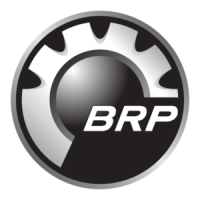Do you have a question about the BRP Evinrude E-Tec E150DSLSUF and is the answer not in the manual?
Imminently hazardous situation that WILL result in death or serious injury if not avoided.
Potentially hazardous situation that CAN result in severe injury or death if not avoided.
Lists key engine, fuel, electrical, cooling, ignition, gearcase, and trim/tilt specifications.
Provides a chart of standard torque values for various fastener sizes in inch-pounds, foot-pounds, and Newton-meters.
Lists and illustrates diagnostic and universal special tools required for service.
Covers hull preparation, transom measuring, drilling, mounting hardware, and transom clearances.
Provides a detailed schedule for routine inspections and maintenance tasks based on time or hours.
Covers steering system, swivel bracket, tilt tube, throttle/shift linkage, and propeller shaft lubrication.
Explains how to check, inspect, and refill gearcase lubricant, including recommended types.
Explains sensor inputs, internal EMM controllers, and the role of internal and external sensors.
Details how the SystemCheck monitor warns the operator of conditions that could damage the engine.
Covers inspection of wiring, connectors, grounds, and specific component connections.
Details LED indicators, diagnostic software programs, and how to interpret fault codes.
Outlines initial inspection steps and how to use diagnostic software screens for analysis.
Describes dynamic tests and testing with a timing light for various engine systems.
Explains the start circuit's function, electric starter operation, battery requirements, and voltage testing.
Covers primary and secondary winding resistance tests for ignition coils.
Details stator resistance tests and output voltage tests for charging system diagnostics.
Covers testing the 12 V charging circuit and the 55 V alternator circuit, including variable load tests.
Outlines tests for the starter solenoid and the no-load current draw.
Covers removal and installation procedures for the Engine Management Module (EMM).
Explains how to set and verify ignition timing using the timing pointer and diagnostic software.
Details the step-by-step process for removing the powerhead from the outboard.
Covers the general disassembly of the powerhead, including fuel systems, EMM, flywheel, stator, and oil components.
Explains how to identify and remove connecting rod caps, pistons, and rods.
Details the removal of the crankshaft, upper and lower seals, and housing O-rings.
Provides instructions for cleaning internal components, exhaust ports, cylinder walls, and pistons.
Covers inspection of cylinder head warpage, crankshaft dimensions, crankcase seal rings, and pistons.
Provides general assembly instructions, emphasizing cleanliness and using new parts.
Covers aligning bearings, installing thrust washers, and oiling wrist pins and bores.
Covers rotating the cylinder block, applying gasket sealant, and installing main bearing dowel pins.
Covers installing alignment pins, powerhead screws, and connecting various components.
Details draining, inspecting, and filling the gearcase with lubricant.
Provides step-by-step procedures for testing the gearcase for leaks using pressure and vacuum.
Covers the step-by-step process for removing and installing the gearcase assembly.
Details water pump disassembly, inspection, and assembly procedures.
Covers pre-disassembly inspection and the removal of components like the propeller shaft and pinion gear.
Covers the process of shimming the driveshaft to achieve correct pinion gear backlash and assembly clearance.
Details the assembly of water intake screens, shift housing, and propeller shaft.
Provides a symptoms chart and service procedures for diagnosing FasTrak system issues.
Covers disassembly, inspection, assembly, and installation of the three-piston trim/tilt system.
Details disassembly, assembly, and adjustments for the single-piston trim/tilt system.
Discusses general safety principles for boaters, the importance of using correct parts, and safe rigging practices.
Addresses fuel handling, storage, and electrical system safety to prevent fires and explosions.
Details the operation and importance of the emergency stop system to prevent accidents.
Emphasizes safe practices for storing, handling, and refueling gasoline to prevent fires and explosions.
| Brand | BRP |
|---|---|
| Model | Evinrude E-Tec E150DSLSUF |
| Category | Outboard Motor |
| Language | English |











